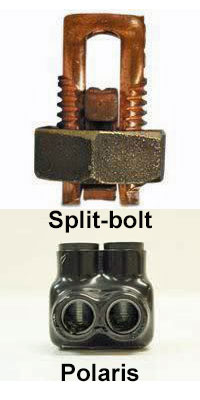Hi,
I have recently installed two antenna's outside on my chimney on the second story of my house (one for OTA TV signal and one cellular antenna). I am attempting to ground these and have installed a new ground rod (8' long) at the chimney base, and will tie both antenna's to it with #10 solid copper grounding wire (per 2008 code).
Now here's my dilemma. My main house electrical service grounding rod by my meter is about 50' away from my newly installed rod. I was planning on tieing these two rod electrodes together with #6 solid core copper wire (also per code). Unfortunately, I cannot find my main rod by the service to tie to. I have dug down about 3 ft following the main house ground conductor and am scared to go further lest I hit and damage that conductor while searching for the rod.
So, I do believe that I could tie the secondary rod #6 bonding wire with the houses main wire by some means (vs directly to the rod) but am looking for opinion for best diy method outside of exothermic welding. My opinion on this is that this bonding wire's main purpose is to bleed off any differential in voltage and currents and not necessarily a primary path for a lighting strike, which is what the secondary rod is for, and subsequently I don't HAVE to tie directly to the main service rod. Is that line of thinking correct?
If so, any suggestions on a good way to tie my #6 bond wire to that main ground wire would be appreciated.
I have recently installed two antenna's outside on my chimney on the second story of my house (one for OTA TV signal and one cellular antenna). I am attempting to ground these and have installed a new ground rod (8' long) at the chimney base, and will tie both antenna's to it with #10 solid copper grounding wire (per 2008 code).
Now here's my dilemma. My main house electrical service grounding rod by my meter is about 50' away from my newly installed rod. I was planning on tieing these two rod electrodes together with #6 solid core copper wire (also per code). Unfortunately, I cannot find my main rod by the service to tie to. I have dug down about 3 ft following the main house ground conductor and am scared to go further lest I hit and damage that conductor while searching for the rod.
So, I do believe that I could tie the secondary rod #6 bonding wire with the houses main wire by some means (vs directly to the rod) but am looking for opinion for best diy method outside of exothermic welding. My opinion on this is that this bonding wire's main purpose is to bleed off any differential in voltage and currents and not necessarily a primary path for a lighting strike, which is what the secondary rod is for, and subsequently I don't HAVE to tie directly to the main service rod. Is that line of thinking correct?
If so, any suggestions on a good way to tie my #6 bond wire to that main ground wire would be appreciated.



